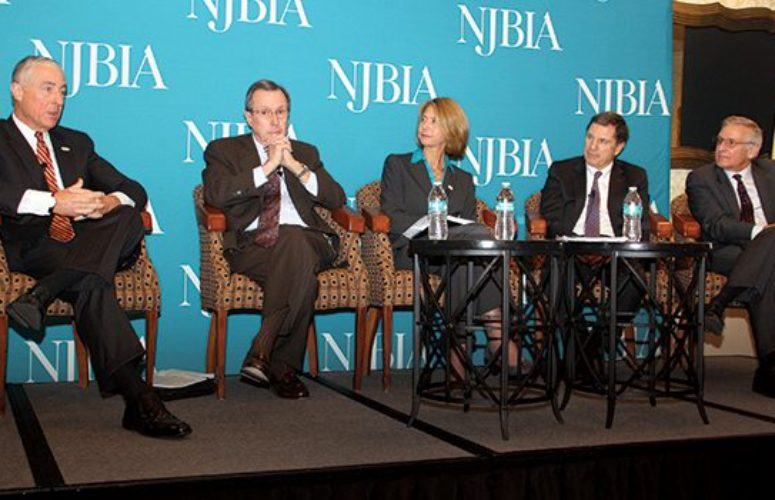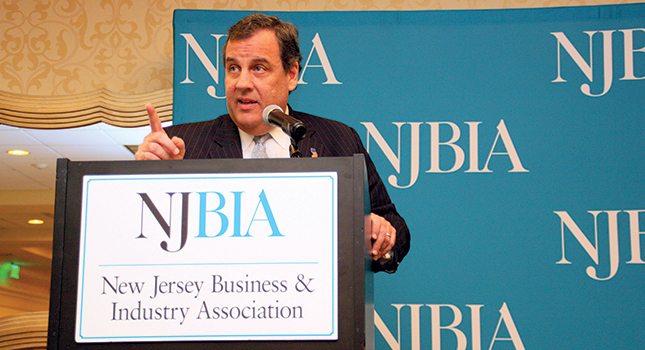
The Myriad Ways of Enhancing the State’s Business Climate
Panelists and Governor Christie discuss what needs to be done to grow the economy and solve the state’s fiscal problems at NJBIA’s Public Policy Forum.
By Anthony Birritteri, Editor-in-Chief On Jan 29, 2016The more than 170 people who attended The New Jersey Business & Industry Association’s Public Policy Forum on December 8 had a ring-side seat to learn how leading economists, business executives, legislators and Governor Christie himself are fighting to make New Jersey a better place to locate and expand a business. No issue was left unturned, as experts weighed in on the Transportation Trust Fund crisis, the state workers’ pension issue, the estate tax, business tax incentives, casino gaming in North Jersey and saving Atlantic City.
NJBIA President and CEO Michele Siekerka kicked off the day’s event, held at the National Conference Center in East Windsor, by explaining the forum “will be a dynamic day full of stimulating discussion. The policies discussed will examine our livelihoods, quality of life and planning for the future.”
Siekerka presented the main results of NJBIA’s 2016 Business Outlook Survey, which revealed that association members are looking forward to a positive year, with sturdy sales and profits and an increase in hiring. However, Siekerka said there was a second story to the survey. Sixty-two percent of respondents said if they planned to expand their business, they would do so in another state. Sixty-six percent said they do not plan to keep New Jersey as their personal domicile when they retire. Finally, 67 percent said that the estate and inheritance taxes are playing key roles in their decision-making regarding the future of their businesses.
According to IRS tax returns, the state has lost a net $18 billion in adjusted gross income between 2004 and 2013 due to outmigration, Siekerka said. This means a loss of: jobs (if business owners and their ventures leave the state); taxable income; emigrants’ spending power; and philanthropic contributions.
“If we take action now, we can build confidence for the future and ensure the long-term sustainability for New Jersey businesses,” Siekerka said.
Naroff Benchmarks NJ’s Economic Future
Presenting his first public overview of the state’s economy as NJBIA’s chief economic advisor, Joel Naroff, president of Naroff Economic Advisors, discussed the need for creating a strong economic foundation in order to improve New Jersey’s business climate. “Going forward, we need to structure the economy so that it fits in with emerging trends and evolving issues the state will face in years to come,” he said. Citing three trending areas, he said the first is a focus on the technical innovation economy. “Do we have the workforce and the educational systems that feed into the innovation economy that will allow the state to get its fair share of growth?” Naroff asked. Second is the “mobile and on-demand” economy, which entails having a robust distribution system to deliver goods and services. The third aspect is being involved in the global economy.
“The state is incredibly positioned to face the future,” Naroff said. “We have a fantastic transportation system capable of reaching global and domestic economies, a highly educated workforce and a high density of income, so that when businesses locate here, they find their markets.”
However, with this good news, there is also bad. “Our operating costs are high and we have been significantly underfunding the transportation infrastructure from a state and federal perspective,” he said. Additionally, the state does not rank high when receiving federal research and development funding.
When fielding questions from the audience, Naroff discussed the importance of a technical education acquired at the high-school and community-college level, the “brain drain” of students leaving New Jersey because of the high cost of living here, and the fact that if the gasoline tax were to increase, it would only be one small element of making the state’s Transportation Trust Fund solvent.
Economic Outlook Panel
The economic outlook panel, moderated by NJBIA’s Michele Siekerka, continued the topic of bringing change to the state and addressing the cost of doing business.
Dr. Jim Hughes, dean of the Edward J. Bloustein School of Planning and Public Policy, Rutgers University, said New Jersey government [state and local] must change its attitude when businesses look to move here. “While businesses looking to relocate to North Carolina are treated like gods because they are bringing jobs and investment into the state, too many times the attitude in New Jersey is: ‘What can we tax them on?’”
“We have to get a grip around state debt,” said Walter J. Brasch, CPA, CGMA, president elect of the New Jersey Society of CPAs. This debt, which grew from $38 billion in 2008 to $74 billion in 2014 and is now hovering around $90 billion, creates uncertainty in the business community. “At what point does this debt become unsustainable?” he asked. The state must “make difficult choices for the long-term and stop focusing on an annual plan.”
Naroff, also a panel participant, echoed Brasch’s comments. “We seem to be moving from one crisis to another, putting band aids on the issues, but the band aids aren’t big enough. We give no thought to what we are doing in terms of creating a foundation for growth. We need to stop the short-term thinking,” he said.
According to Michael McBride, partner at the law firm of Connell Foley, LLP, “There ought to be legitimate debate to resolve issues like taxes and pension reform. People need to believe the economy is moving forward.”
As it stands, McBride said the state is overregulated. Rules at the local, county and state levels make it difficult for businesses to expand. However, he did commend the political leadership in towns such as Jersey City, Newark and Camden for having “a business growth mentality.”
When Siekerka discussed the state’s incentives programs and how cities like Camden are greatly benefitting from them, Naroff responded that these programs (such as Grow NJ) can work as long as there is a rationale behind what is being incentivized. “The criticism of the programs is that they are [given] without an idea of what makes sense within the context of a community,” he said.
Hughes agreed, saying that, for example, a great share of incentives should be directed at companies that service world markets, versus those that market solely to New Jersey. “If you are serving national or world markets, you are an externally supported industry. AT&T, at its peak, is a prime example of that. It had a monopoly on telephone service. New Jersey accounted for 3 percent of the nation’s population, therefore 97 percent of AT&Ts revenues came from out of state. That was a wealth-creating activity,” he said.
Overall, Naroff said a tax system that is fair to everyone is needed. If incentives are given to certain companies over others, a scenario of winners and losers is created.
“So, you have to be clear that there is a reason for giving the incentive. It’s not just because you may want a company in your town, but that you want the company in your town to be a magnet for other companies. Then it becomes financially positive,” he said.
Ending the discussion on an upbeat note, Siekerka asked the panelists what they thought some of the state’s positive attributes were. The responses included the state’s highly educated workforce, its higher education system, access to major markets and its quality of life.
Legislative Leaders Panel
In a lively and candid discussion about how they are grappling with pertinent business issues including the Transportation Trust Fund, the estate tax, raising the retirement income tax threshold, the Business Employment Incentive Program (BEIP), and casino gaming in North Jersey, the state’s top legislative leaders gave attendees a glimpse of what politics is like in Trenton today … great bipartisanship and camaraderie that could turn on a dime to partisanship. Panelists were goaded on by moderator Steve Adubato of Caucus NJ who, at one point, scolded the panelists for showing attendees “how the sausage is made.” He was referring to a comment by Assembly Republican Leader John Bramnick that the four legislative leaders, including himself, Senate Republican Leader Tom Kean, Jr., Assembly Speaker Vincent Prieto and Senate President Stephen Sweeney, rarely meet together in one room to solve the state’s problems. “This should be the demand of the people in New Jersey,” Bramnick said.
Prieto said that he and Sweeney (who was represented at the event by Senate Deputy Majority Leader Paul Sarlo) meet with Governor Christie on a regular basis and have a good working relationship with him, but it is important for everyone to be involved in a bipartisan fashion. He and Senator Kean agreed that the best legislation is bipartisan in nature, with both sides compromising.
Asked by Adubato what the No. 1 issue business people expect legislators to deal with in Trenton, other than the Transportation Trust Fund (TTF), Prieto said, “You have to include the TTF in the discussion because solving that issue will have a domino effect on the economy.”
Sarlo added, “If you invest in transportation and infrastructure, people will get to work faster and products will move quicker. At the end of the day, we need to make this infrastructure investment.”
The biggest issue is the state’s high taxes, Bramnick said, which make it not only difficult to conduct business here, but die here (referring to the estate and inheritance taxes).
Because of the tax climate, people and their wealth are leaving the state. Kean mentioned that since 2004, $18 billion of taxable income has left New Jersey, and many residents are retiring to states such as Pennsylvania, which doesn’t tax retirement income and deferred income. Overall, he said government needs to create an environment in which families and businesses want to stay here for the long term.
Sarlo commented that 21 Democratic Senate votes could be realized to phase out the estate tax, raise the retirement income tax exemption threshold (for pensions, 401(k)s and IRAs) and raise the gas tax.
On the topic of casino gaming, Prieto, whose district includes parts of Bergen and Hudson counties, would like to see casinos open in northern New Jersey. He says there are more than 10,000 hotel rooms in the northern New Jersey region that have 90 percent occupancy year round. “These are the [visitors] who never go to Atlantic City. They visit casinos in Yonkers, NY or Bethlehem, PA. “We can capture that universe of people, which would mean income for our state. Then, we would be able to give you the incentives you are seeking to make your businesses flourish,” he told the audience.
On January 11, Governor Christie brokered a compromise between competing resolutions in the Senate and Assembly to put a constitutional referendum concerning casino gaming in North Jersey on the upcoming November 8 ballot. In the original resolution supported by Senate President Sweeney, existing Atlantic City casino owner(s) must have 51 percent stakes in the two casinos planned for North Jersey. Meanwhile, Assembly Speaker Prieto’s resolution called for just one winning bidder to have an existing interest in an Atlantic City casino. The compromise sides more with Sweeney’s plan, but the new proposal says that a new operator must invest $1 billion or more in a new North Jersey casino. Additionally, should the referendum pass, Atlantic City casino owners have just six months to propose a project. If no plans are offered by that time, an out-of-state casino operator can come in and seek a license.
About $200 million in casino tax revenues a year from the North Jersey casinos would be used to assist Atlantic City in its revitalization, according to Sweeney. At press-time, the Legislature has six months to approve the compromise by three-fifths majority in order for it to appear on the ballot.
At the Public Policy Forum, Sarlo commented, “Without a source of revenues from North Jersey gaming, Atlantic City can’t survive.”
When Adubato commented that certain people believe that all that can be done to save Atlantic City has been done, Bramnick responded, “You can’t allow Atlantic City to go bankrupt. Think of the message you are sending to the bond rating community.”
The legislators discussed revising the BEIP program at the Dec. 8th event. More than a week later, they passed a bill that converts BEIP grant commitments into refundable tax credits so that businesses can count on the state honoring its agreements on job creation and investment. On January 11, Gov. Christie signed the legislation.
The New Jersey Economic Development Authority has executed 465 BEIP grants that have spurred the creation of 110,000 jobs and leveraged more than $12 billion in capital investment.

Taking time off from the presidential campaign trail, Governor Chris Christie, the keynote speaker at the Public Policy Forum, talked about his administration’s achievements these past six years and warned the business community to fight against anti-business legislation by donating campaign funds to pro-business legislators.
Gov. Christie Says Businesses Must Act Now
Taking time off from the presidential campaign trail, Governor Chris Christie, the keynote speaker at the event, talked about his administration’s achievements these past six years and warned the business community to fight against anti-business legislation by donating campaign funds to pro-business legislators (mostly Republicans, according to the governor).
“We are six years and 430 vetoes into this governorship, yet I still keep getting bills containing job-killing tax increases, job-killing regulatory increases and other types of legislation that would make the business environment in the state worse,” Christie said. “We are in the thick of this fight every day … this is a day-to-day battle that you must be engaged in.”
The governor said that in the midst of anti-business bills, his administration was able to achieve $2.3 billion in business tax cuts, for which he credited NJBIA’s advocacy. He also mentioned killing the corporate business tax surcharge and putting in place economic incentive programs that are revitalizing cities such as Camden and Newark.
“I would have preferred to eliminate the corporate business tax and lower the income tax, but the people in New Jersey are like the 15-year-old-kid conducting experiments in the basement: They elect a conservative governor and a liberal Democratic legislature to mix things up to see what happens,” Christie said.
Saying his administration and Republican counterparts in the Legislature did the best they could under the circumstances, Christie touted the state’s unemployment rate, which was 10 percent when he took office and is now down to 5.4 percent. He also said that there was no private-sector job growth during the eight years before he took office. “Today, we have 218,000 new private-sector jobs created since February 2010. In the past year alone, the private sector added 54,100 jobs, and last month (November), New Jersey created more private-sector jobs than any state in the nation (8,000 jobs, according to the United States Bureau of Labor Statistics).
Commenting on the constitutional amendment on the November ballot that would require annual pension payments for state workers to be made, Christie commented, “Beware of what is coming down the pike.” Spearheaded by Senate President Stephen Sweeney, Christie said the amendment, if approved, will mean “a $3-billion tax increase on 90 percent of the state’s residents to benefit 10 percent of the people (state union workers).”
The governor said he is happy to “be the guy in front of the tank” for the remaining time he has left in office, but then added, “the Constitution is going to remove me from the front of the tank pretty soon.”
He added that the business community could be more powerful than the 800,000 public-sector workers who spend millions of dollars supporting Democratic candidates. “There are more of you and you make more money. … If you are motivated in wanting to make the state a better place for your employees, shareholders, investors, children and grandchildren, open up the check book and get into the fight,” he said.
The governor also commented that he has been attending NJBIA meetings for 13 years.
“NJBIA understands the mission of businesses, it understands the challenges. What I love about NJBIA is that it never gets distracted by playing politics. It keeps its eyes on the ball. It represents its members and advocates consistently for their interests. No other group in the state does it at the level NJBIA does,” Christie said.
Related Articles:






